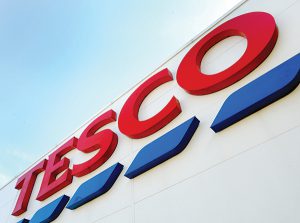Bloomberg
Tesco Plc said shoppers are buying fewer items and trading down to cheaper own-brand versions of staples in an “incredibly challenging†market hit by the worst inflation in 40 years.
Britain’s biggest supermarket chain reported a greater-than-expected 1.5% decline in comparable UK sales in the first quarter, in fresh evidence of how rising prices are changing shopping
behaviour.
“Inflation is very real for everyone,†said CEO Ken Murphy. “Where it is being passed on our aim is to ensure it’s a little bit less and a little bit later than the rest of the market.â€
Murphy said there are early signs of customers switching to store-brand versions of bread, pasta and beans — items where prices have risen the most. Although the number of shoppers shifting from branded products to private label goods is still relatively small at the moment, it could start to increase during the summer.
Earlier this year Tesco Chairman John Allan said that cash-strapped shoppers are asking the grocer’s checkout staff to stop when they hit £40 ($49) before putting the rest of their goods back on the shelves. Rival supermarkets have similarly reported changing consumer habits as people try and balance their monthly bills.
Iceland Foods’ managing director Richard Walker told Sky News that he believed some of its poorest customers are switching to food banks to try to make ends meet.
Official figures showed that the spending power of UK households fell the most in at least 21 years as wage increases were eaten up by the fastest inflation in decades.
The fall in pay packets helps explain why consumers are starting to spend less and being more selective in what they buy. Fashion retailers Asos Plc and Boohoo Group Plc reported that shoppers are sending back more items as they realise they can’t afford to buy as many outfits as before. Automotive and cycling retailer Halfords Plc also said this week that consumer demand was under real pressure.
Tesco, which also owns wholesaler Booker, warned in April that profit will be squeezed this year as the company tries to keep prices low for consumers and supply-chain disruptions weigh heavy. It’s a shift of sentiment from the pandemic when Tesco benefited from more people eating at home and shopping online, leading the grocer to raise its profit forecasts twice in the last financial year.
 The Gulf Time Newspaper One of the finest business newspapers in the UAE brought to you by our professional writers and editors.
The Gulf Time Newspaper One of the finest business newspapers in the UAE brought to you by our professional writers and editors.
